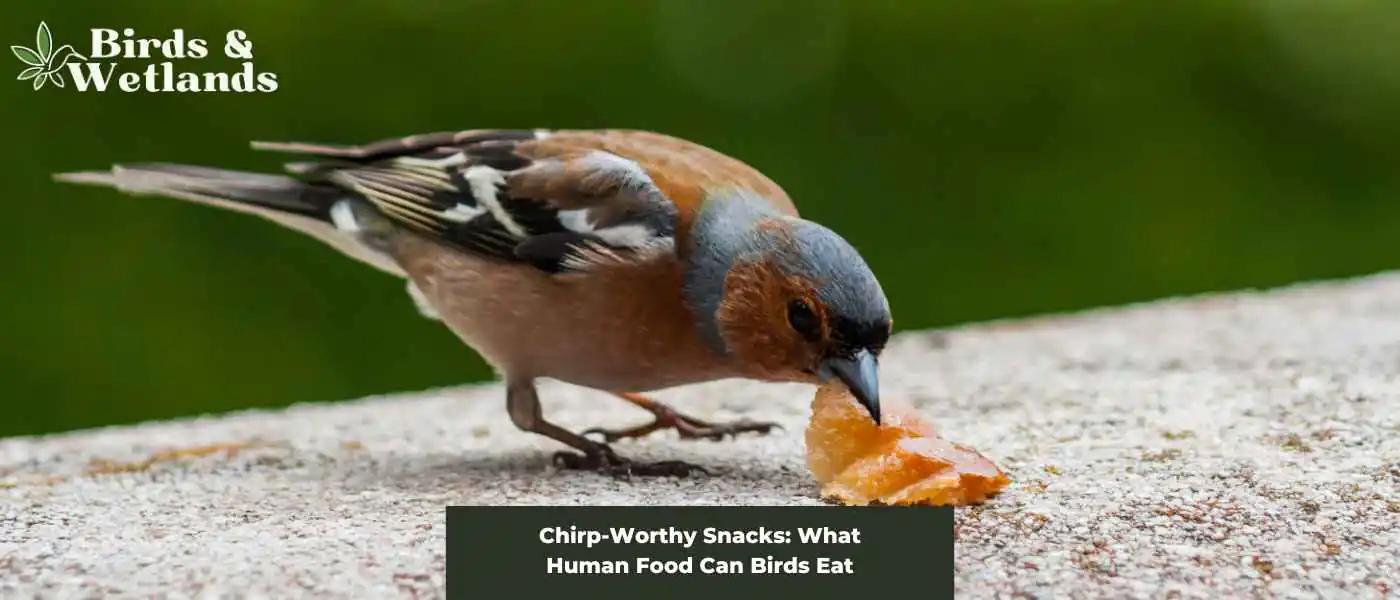Have you ever spent hours staring out of your window, hoping to catch a glimpse of a beautiful backyard bird, only to be met with empty bird feeders? Or worse, a feeder that’s been hijacked by pesky squirrels? Trust me, I’ve been there.
Key Takeaways
Many types of human food are safe for birds, but it’s important to remember that not all are suitable or healthy. Here are some human foods that can be safely shared with birds:
- Fruits: Many birds love fruit. Apples, pears, bananas, melons, peaches, and berries can all be suitable choices. Just make sure to remove any seeds or pits, as these can be harmful.
- Vegetables: Leafy greens, peas, carrots, broccoli, and corn can be good choices. These should be served raw, steamed, or boiled with no added salts or seasoning.
- Grains: Whole grains such as brown rice, barley, quinoa, oats, and whole grain bread or pasta can be offered. Again, these should be unseasoned.
- Nuts and Seeds: Unsalted and unroasted nuts and seeds can be a nutritious treat. Pumpkin seeds, sunflower seeds, and peanuts are often appreciated.
- Eggs: Boiled or scrambled eggs can be a source of protein for birds. These should be served plain with no added salt or butter.
- Cooked Legumes: Chickpeas, lentils, and other beans can be given to birds, provided they are thoroughly cooked (to remove harmful toxins) and unsalted.
It’s essential to keep in mind that these foods should only supplement a bird’s diet and not replace their normal food intake. A diet too high in human food can lead to nutritional imbalances. As always, introduce new foods gradually and observe for any negative reactions.
Seeds and Vegetables
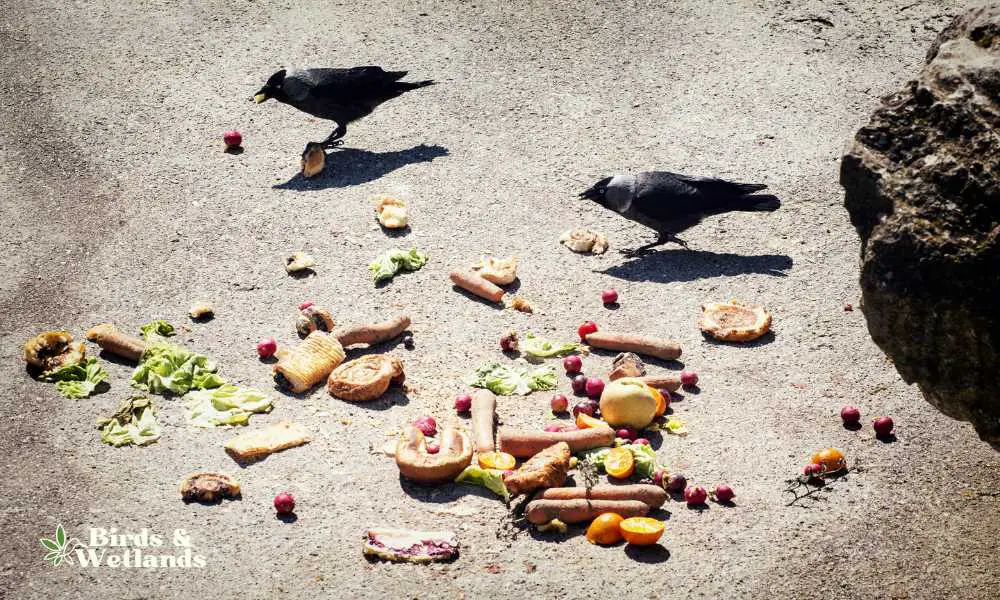
Feeding kitchen scraps to adult and young birds is a great way to supplement their diet and attract them to your yard. Not only is it an easy and affordable way to provide extra nutrition to the birds, but it can also reduce food waste in your household.
When it comes to feeding wild birds kitchen foods, it’s important to ensure they are safe and suitable for consumption. Some vegetables can be harmful to birds, so it’s important to avoid giving them anything toxic or potentially harmful. Examples of vegetables that should be avoided include avocado, onion, and garlic.
Some birds eat raisins, carrots, broccoli, peas, whole nuts, sunflower seeds, sweet corn and squash seeds. You can mix them with many raw vegetables, suet cakes, fat-based food bars and other kitchen leftovers. If you have leftover baked potatoes or vegetables from canned soups, they can become popular feeder food too!
Cooked Pasta and Rice
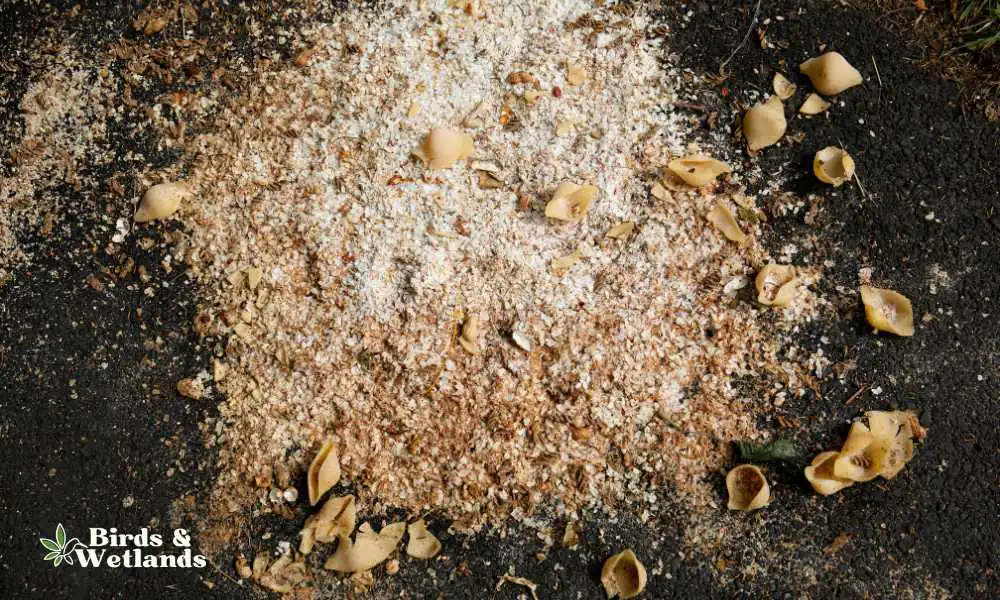
Cooked pasta and rice are safe and healthy options for birds as part of a balanced diet.
Pasta and rice are excellent carbohydrate sources, providing birds with the energy they need to fly, forage, and maintain their body temperature. These foods are also easily digestible, making them great options for birds with sensitive digestive systems.
When using uncooked rice or pasta as bird food, it’s important to avoid adding any sauces or seasonings, as these can be harmful to birds. Plain, cooked pasta and rice can be served either warm or cold, and can be mixed with other bird-friendly foods like bird seed, fruits, vegetables, and seeds. You can feed scraps in a platform feeder or a feeding tray.
Meat
Feeding birds scrap meats such as beef fat trimmings, animal fat, marrow bones, meat bones and beef grease drippings can be a great way to supplement their diet with much-needed protein and fat, which are essential for their health and energy levels. Keep in mind that only meat-eating birds may love this food.
First, it’s important to use plain meat without any added seasoning or spices. Beef fat trimmings, for example, can be a great option since they are high in fat and protein. Avoid using processed meat or meat cooked with spices or other additives, as these can be harmful to birds.
When offering scraps of meat to birds, it’s best to do so in small amounts. Too much meat can upset their delicate digestive systems, so it’s important to only give them a handful at a time. It’s a good idea to scatter the scraps on the ground or a bird feeder rather than leaving them in a pile, as this can attract unwanted pests.
Also, do not feed wild birds rotten meat. Any rotten food contains bacteria, molds and toxins.
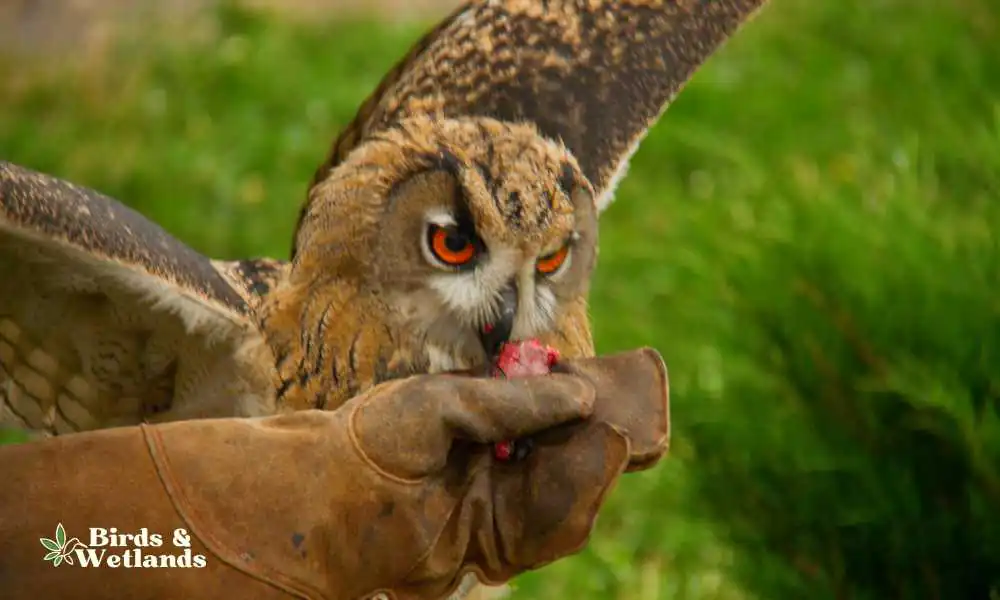
Eggs and Egg Shells
Cooked eggs and egg shells can be a great supplement to a bird’s diet, providing additional minerals and essential nutrients that may be lacking in their regular food.
When feeding eggshells to birds, it’s important to remember that they should be offered in moderation, as too much calcium can be harmful. A small pinch or a sprinkle of crushed eggshells mixed into regular bird foods of nesting birds is usually sufficient.
The benefits of feeding eggshells to birds are numerous. Eggshells are an excellent source of calcium, essential for the growth and maintenance of healthy bones, beaks, and feathers. They also contain other important minerals like magnesium, potassium, and phosphorus. These nutrients can help support a bird’s immune system and promote overall health and vitality.
To prepare eggshells for birds feeding, wash them thoroughly with soap and water to remove any traces of egg or debris. Then, place the eggshells on a baking sheet and bake them in an oven at 250°F (120°C) for around 20-30 minutes.
This will help to sterilize the shells and remove any residual moisture, making them safe and easier for birds to consume. Once the eggshells are fully cooled, crush them into small pieces using a mortar, pestle, food processor, or rolling pin.

Peanut Butter
Peanut butter is a rich source of protein, which is essential for birds’ health and growth. It is also a good source of fat, which provides them with the energy they need to stay active and fly around.
It is best to feed peanut butter to birds in the winter months when food is scarce. The cold weather also keeps peanut butter firm. During this time, birds have a harder time finding food, and peanut butter can be a great source of energy and nutrition for them.
There are several ways to offer peanut butter to birds. One popular method is to spread a small amount of peanut butter on a pinecone or a slice of bread and hang it from a tree as a diy bird feeder or a buy or make bird feeder.
Another way is to mix peanut butter with seeds or nuts and place it in a small dish or feeder. It’s essential to avoid using peanut butter that contains salt, sugar, or other additives, as these can be harmful to birds.
Many bird species enjoy eating peanut butter. Some birds most likely to be attracted to it include woodpeckers, chickadees, house sparrows, nuthatches, and titmice. These birds have strong beaks that can easily break through the shell of a peanut, making it easier for them to access the butter inside.
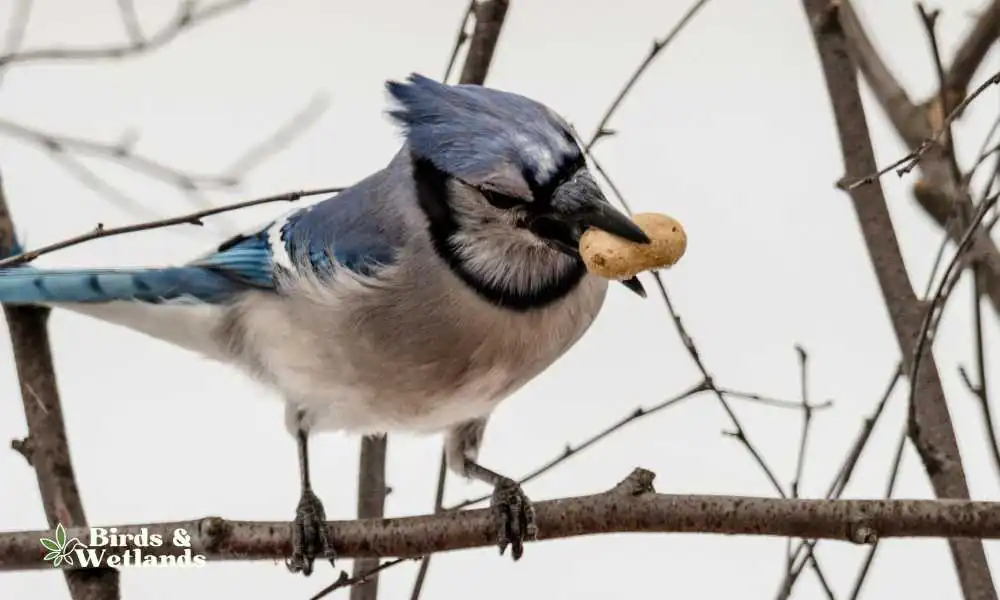
Pet Food
Pet foods such as dog or cat food can be a great way to supplement a bird’s dietary needs. In fact, dog food is given to baby birds that have a protein-rich diet. However, it’s important to note that not all pet foods are suitable for birds, and feeding inappropriate food can cause serious health problems.
The amount of pet food to feed birds depends on the type of bird and the specific pet food being fed. Generally, it’s recommended to feed birds a varied diet of fresh fruits and vegetables, along with a portion of high-quality pelleted food. Soak hard pet foods in warm water to soften them up. You can also minimize pests by using hanging feeders.
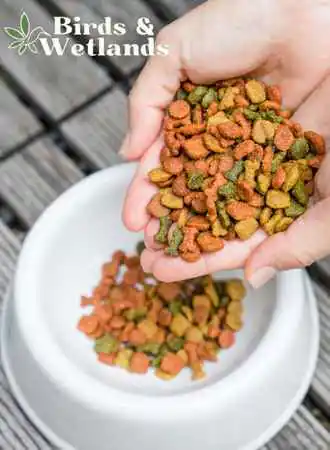
Cereals, Bread and Other Baked Goods
Many birds enjoy plain cereals. Choose the right types of cereals when feeding birds, including plain, unsweetened cereals like corn flakes and shredded wheat. These cereals are a good carbohydrate source and easy for birds to digest. Avoid cereals that are high in sugar, salt, or additives, as these can be harmful to birds’ health.
Feeding birds bread is a controversial topic. On one hand, bread has little to no nutritional value for birds and they are eaten quickly which often results in overeating. On the other, bread can provide birds the much-needed energy when their natural food source is scarce.
If you have stale bread that isn’t moldy, crumble it up and feed it to the birds. Many birds prefer whole grain bread and it is good for them due to its fiber source.
Don’t feed birds salty snacks and baked goods with cream cheese. There are many alternative foods that are safer and healthier for birds.

